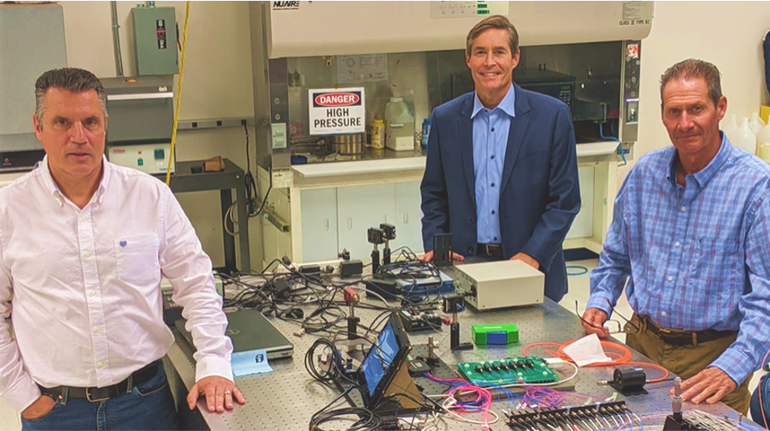Two men from Connecticut walk into a hotel.
No, it’s not the start of a joke. Rather, it’s the origin story of Lumeda Inc., a Rocky Hill startup with a mission of reshaping the treatment of lung cancer.
Paul Sanders, co-founder of Lumeda, describes the meeting of Connecticut photonics experts and western New York oncology innovators as little short of serendipity. But the result is a technology that may soon enable more people to survive non-small cell lung cancer.
Oncologists at Buffalo’s Roswell Park cancer research campus recognize focused light could be used to improve surviving tissue at the site of surgery to remove a cancerous lung tumor. The challenge was focusing the light and delivering a consistent level of therapy.
That’s where Sanders’ expertise comes in. He’s spent more than 35 years in photonics, building a record of success in technical, product management and business development roles with industry leaders including 3M, JDSU, CiDRA Corp. and Weatherford.
His background overlaps with his co-founder Trevor MacDougall. Together, they founded — and later sold — QOREX, which designed and made advanced fiber optic sensing systems for harsh environments. Between them, they hold almost 90 patents.
They struck a deal with Roswell Park for exclusive commercialization rights for the technology they’d develop and Lumeda was born.
Today, MacDougall and Sanders are vice presidents of Lumeda. They brought in Alexander Zinke, a veteran of business development and commercialization projects in health care, as CEO.
The company in April announced that it raised $4.3 million in Series A funding from Connecticut Innovations and Branford-based Cycle Venture Partners. It has raised $5.3 million since its founding.
Sanders modestly says the photonics development was “pretty straight forward.”
Photodynamic therapy (PDT) is an established practice in treating non-small cell lung cancer. The light works with a photosensitizer agent by illuminating margins in the surgical bed after tumor removal and before wound closure. Improving the health of that adjacent tissue is key to reducing the rate of cancer recurrence.
Lumeda’s DigiLum is a complete PDT system that delivers consistent levels of light at regulated intensity.
The reusable hardware unit stationed in the operating room is assembled in Rocky Hill and has a starting price of $45,000. Sanders expects to ship Lumeda’s first complete unit to Roswell Park at the end of April.
In addition, a single-use applicator, drugs and chemicals add about $15,000 to the cost of each treatment. Sanders says that overall treatment price will be cost-efficient compared to alternatives and he expects approval for patient insurance reimbursement once Lumeda’s process clears FDA hurdles.
“The R [research] is done; what we need is D [development],” he said. And that development hinges on success of the clinical studies.
Two clinical studies have begun at Roswell Park, establishing effectiveness and safety of the process. Results are expected in 2022. A third — establishing safety of the PDT when used in combination with immunotherapy — will begin in the fall of 2022 with results expected in 2024.
Sanders and Zinke acknowledged the technology has the potential to advance treatment for other cancers but said Lumeda is focused on the success of the lung cancer product before exploring other opportunities.
Zinke said the company does not foresee becoming a manufacturer. After successful Phase 2 trials, Lumeda would seek a partnership with a deep-pocketed pharma or medical device firm to take the product through Phase 3 trials and to market.



